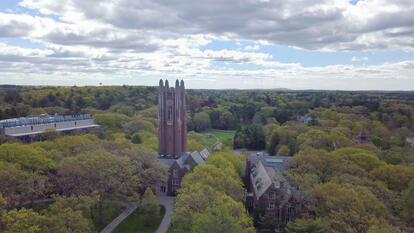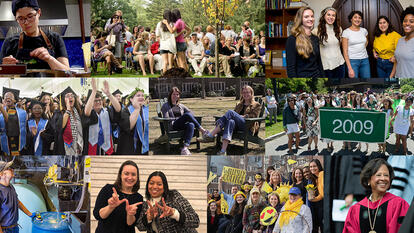As SCOTUS Hears DACA Arguments, Alumna Helps Lead the Legal Challenge

In a pivotal moment for immigration law and policy in the United States, the Supreme Court is hearing oral arguments on November 12 against the Trump administration’s decision to rescind Deferred Action for Childhood Arrivals (DACA), a 2012 policy enacted by then-President Barack Obama, created to support “Dreamers,” or children brought to the U.S. illegally by their parents.
Sonya Sanchez ’01, senior counsel at the University of California, helped draft the brief filed by the Regents of the University of California in the university’s litigation challenging DACA. Wellesley joined 165 higher education institutions in filing an amicus brief in the case on September 27.
Sanchez said her work on DACA “is part of a thread I have found meaningful in my life—to serve vulnerable and underserved populations and fight for what is right while being mindful of higher values.”
Growing up in the small town of Torreón, N.M., Sanchez said her parents spoke candidly with her about poverty and inequality, making it clear that working for a just and equitable world was critical. As the only child of a mother who was an X-ray technician at the Veterans Affairs hospital in Albuquerque and a father who worked in construction and maintenance, Sanchez valued her parents’ sacrifices for her education.
“When I was young, my mother had a two-hour commute and worked the graveyard shift so that she could take me to a Head Start program, and later to school,” she said.
Sanchez, the first member of her family to attend college, majored in philosophy at Wellesley. “My interest had a lot to do with morality, justice, and ethics,” she said. “My parents deferred to my judgment when it came to my choice about my education and career. They expected me to make the most of my opportunity to attend Wellesley.”
During her years at the College, Sanchez returned to New Mexico in the summers to work at a domestic violence advocacy center that served Native American women and children. “One of my colleagues was a lawyer,” she said. “I remember being really struck by the power of the law and the difference it made in our clients’ lives. These were black and white issues, things like obtaining a restraining order to protect women from men who beat them.”
After graduating, Sanchez earned a master’s degree in education from Harvard and a law degree from Stanford. She joined the University of California in 2015, attracted to the school in part because of its large population of first-generation students.
Sanchez did not anticipate working on the DACA issue when she joined UC, but she values her role in drafting the university’s stance in challenging President Trump’s decision to rescind it.
“One of our contentions is that the government didn’t follow proper steps and legal procedures to rescind DACA,” said Sanchez. “There is so much at stake. DACA recipients work in this country, they pay taxes, and make other contributions to our society. The students who go to our schools are studying to become doctors, teachers, and other professionals. Ending the policy would hurt many families and communities.”
President Paula Johnson, in a recent letter to the Wellesley community explaining the College’s decision to join the amicus brief opposing the Trump administration’s decision to rescind it, said: “Wellesley is proud to stand with our peers to argue that ending DACA would hurt students, campuses, and the country,” President Paula Johnson recently wrote in to the Wellesley community.
A decision from the Supreme Court is expected next year. The campus community can find additional information and resources regarding immigration on Wellesley’s website.
"Like so many other Wellesley women, I try to harness the tremendous educational benefits I've received to lift up others and make a difference,” Sanchez said.



